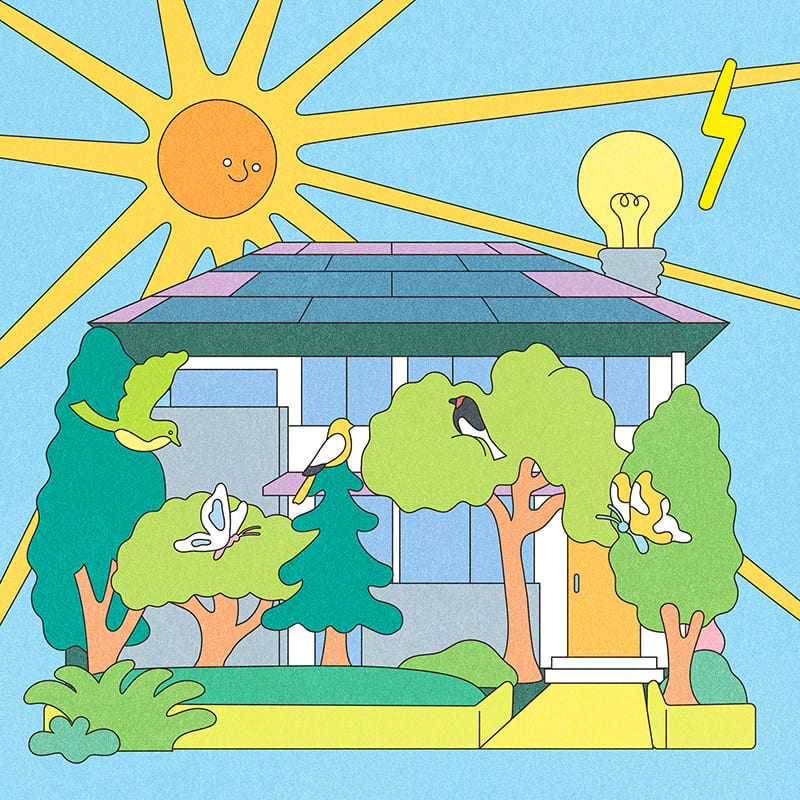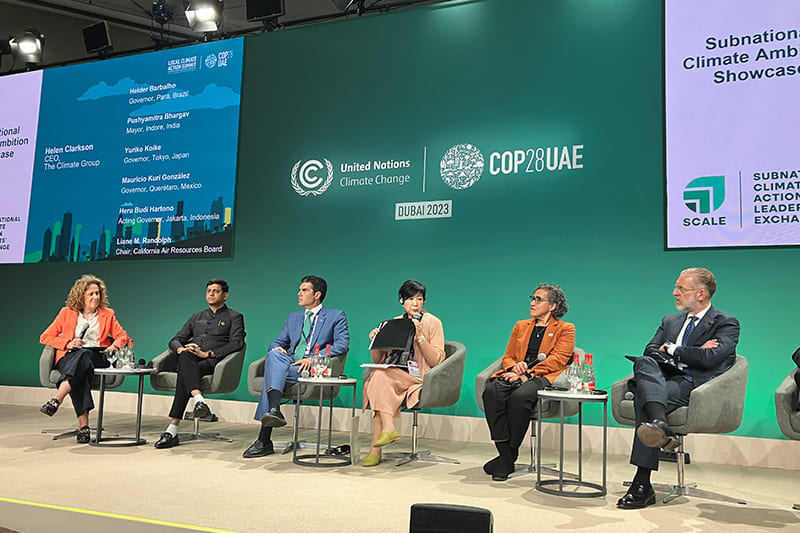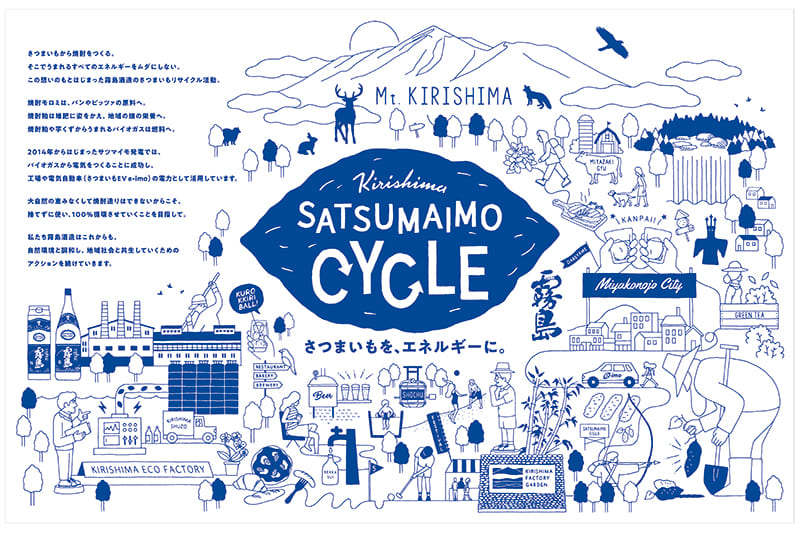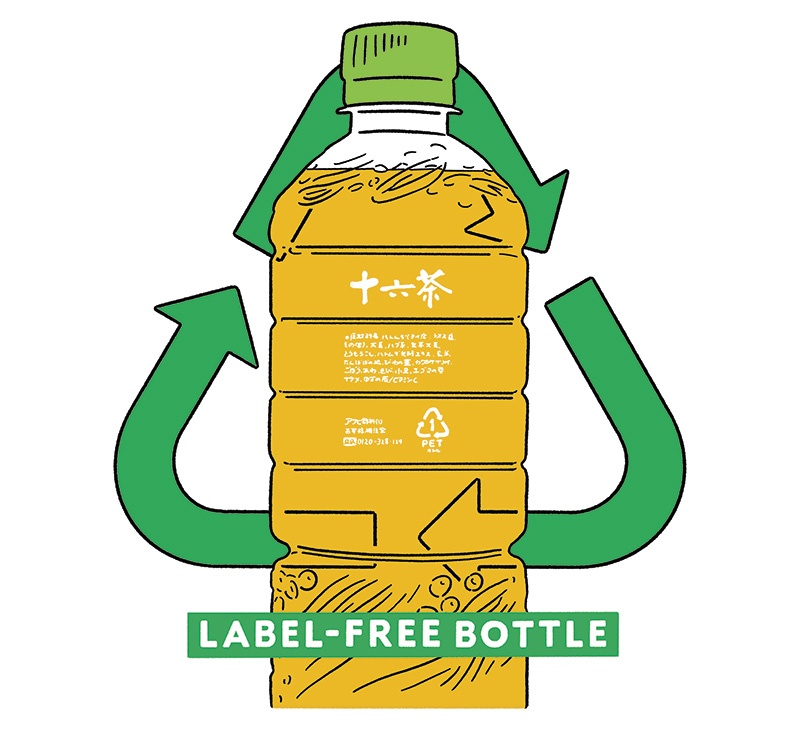June 27, 2025
Yokogawa Electric’s control systems cut emissions
VOL. 17: Yokogawa Electric Corp.
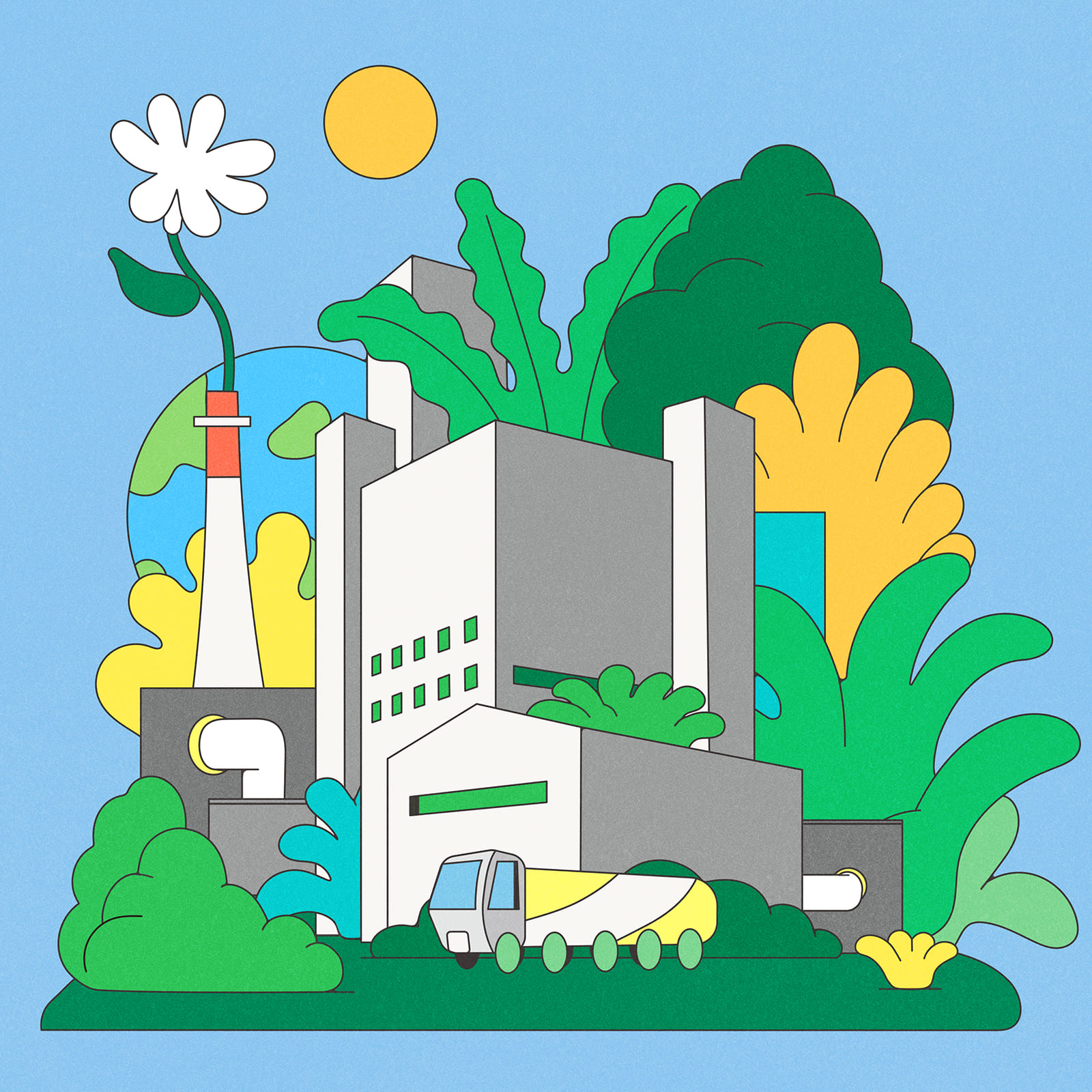
Yokogawa Electric’s strong points
1.Uses “distributed control systems” for plants to assist customer companies’ decarbonization efforts
2.Aims for reducing customers’ CO2 emissions by 1 billion tons
3.Involved in a project to reduce CO2 emissions at the Dutch port of Rotterdam, which seeks to become Europe’s largest hydrogen hub
4.Has active roles in renewable power generation projects in Australia and Ishikari Bay

Yokogawa Electric Corp. has introduced control systems for large plants and factories in a broad range of industries, including petroleum refining and chemicals, steel, textiles, pharmaceuticals, food, water, power generation and gas.
It is a company that places sustainability measures and initiatives at the core of its management policy. The international nonprofit group CDP put Yokogawa Electric on its 2024 A Lists, published this April, in the categories of climate change and water security for a second consecutive year.
Yokogawa Electric is also a manufacturer, producing measuring instruments and control systems. It has pledged to reduce its Scope 1 and 2 (direct and indirect) greenhouse gas emissions to zero by 2030. For Scope 3 (supply chain) emissions, which in fiscal 2023 totaled 640,000 tons, or over 90% of the company’s total emissions of greenhouse gases, it has set a target of reducing them 30% by fiscal 2030, compared to the level in 2019, and 100% by 2050.
But these figures alone may be relatively insignificant for Yokogawa Electric, because its control systems have contributed significantly to reducing carbon dioxide emissions and improving the efficiency of renewable power generation for companies around the world. The reductions from these contributions reach into the hundreds of millions of tons, far exceeding the amount the company itself emits.
Billion-ton CO2 cuts
In 2017, Yokogawa Electric announced its Three Goals setting out its vision for society in 2050, summarized as “Achieve net-zero emissions; stopping climate change,” “Ensure well-being; quality life for all” and “Make the transition to a circular economy; circulation of resources and efficiency,” and expressed its resolve to transform itself toward them (see the article in the box).
At the same time, it set medium-term targets for 2030 in which it aimed to achieve a “CO2 emissions control amount through customers” of 1 billion tons over a period from fiscal 2018 to 2030 — a total comparable to the amount that Japan as a whole emits in one year.
How is it possible for Yokogawa Electric to set such ambitious targets? The answer lies in its core “distributed control systems” (DCS) for plants and factories.
It introduced the Centum DCS in 1975, and since then has installed more than 30,000 units in plants and factories in more than 100 countries.
Centum, celebrating its 50th anniversary this year, has evolved into Centum VP, an advanced version that can manage various phases of facilities’ life cycles: design and engineering, equipment installation, production, updating and, finally, decommissio-ning.
The company’s control-related business accounted for 94% of fiscal 2024’s total sales of ¥562.4 billion ($3.9 billion) and is still growing. The leading source of earnings is its energy and sustainability business, which includes renewable energy.
“I think a large-scale project at the Port of Rotterdam is the example that shows how our control systems and solutions contribute to the global environment in the most understandable way,” said Akira Fukuda, a Yokogawa Electric senior vice president, executive officer and head of the corporate administration headquarters, who is responsible for the company’s sustainability measures.
The Dutch port, the largest in Europe, is also an energy base with more than 40 petrochemical plants and related facilities, and is now undergoing a transformation centered on hydrogen.
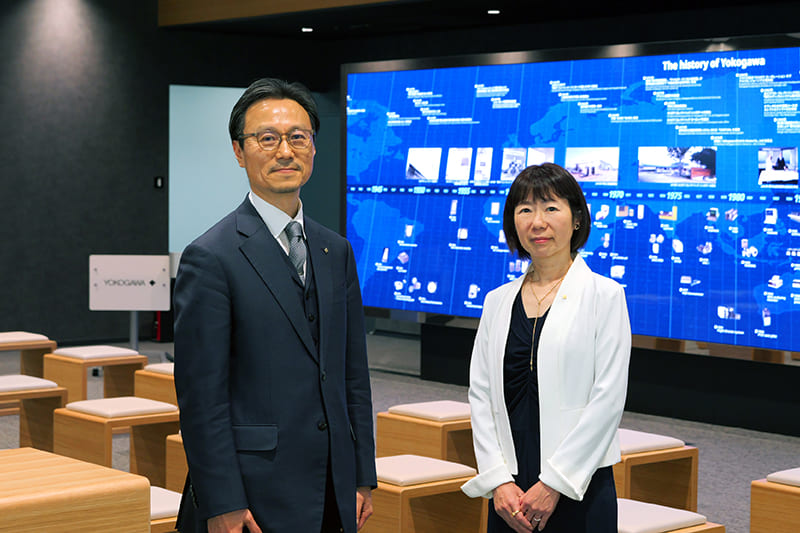
PHOTO: OSAMU INOUE
Rotterdam hydrogen hub
The U.K. oil major Shell PLC is constructing a plant that will daily produce up to 80 tons of “green hydrogen” using electricity from offshore wind power and other sources, aiming to bring it online this year. The U.K. oil company BP PLC and the French gas company Air Liquide SA also plan to build hydrogen plants of similar scale at the port.
Hydrogen produced at the Port of Rotterdam will be delivered to European Union countries and elsewhere through pipelines and liquefied-hydrogen carriers, contributing to decarbonization. As the port undergoes a transformation into one of the world’s largest hydrogen hubs, Yokogawa Electric is supporting this extraordinary project as a partner.
In September 2023, the Port of Rotterdam Authority and Yokogawa Electric announced they had begun a study on interindustry collaboration aimed at finding ways to use energy and resources efficiently at industrial complexes. They said a preliminary study indicated that optimization of the supply and demand for electricity among operators could cut costs by 5% as well as reduce emissions of carbon dioxide.
“So, we have diverse companies operating diverse businesses in the limited area like an industrial park,” Fukuda said. “And we had to find a way to optimize energy and resource use for the area as a whole. The goal was clear, but how could it be done? It was an elusive puzzle.”
He went on: “We have a concept of ‘system of systems,’ which means a group of independently operated and managed systems work together to form a larger system that creates new value. By further integrating the control systems of each company for heat, electricity, hydrogen, etc., you can expect to reduce energy consumption and CO2 emissions.” In short, the plan is to take advantage of strengths in consulting and data analysis to optimize energy usage.
Yokogawa Electric has also developed relationships with individual companies involved in the development of the Port of Rotterdam. For example, it was selected as the main automation contractor for the hydrogen plant being built by Shell.
The manufacturing of hydrogen requires a wide range of functions, including offshore wind power generation and access to water. If Yokogawa Electric’s know-how on control is imparted to companies operating across the port, everyone will stand to benefit from the carbon reductions and energy savings achieved through optimization. The Port of Rotterdam Authority appears to be looking ahead to that future.
Wind power in Japan
In addition to distributed control systems, Yokogawa Electric has another control-related “weapon,” called the collaborative information server.
Whereas a DCS focuses on controlling facilities and equipment, CI servers focus on collecting and analyzing information from facilities and equipment. When combined with a DCS, they help achieve even more efficient operations and also enable the remote monitoring of facilities and equipment via the internet.
CI servers have also begun to play an active role in the field of renewable energy.
Australia’s largest commercial green hydrogen project currently underway, called Yuri, uses a control system centered on a Yokogawa Electric CI server. The system aggregates a large amount of data collected from the related facilities. Centralized management then supports swift operational decision-making.
In Japan, a control system centered on a CI server is playing a key role at the Ishikari Bay New Port Offshore Wind Farm, one of the largest facilities of its kind, which started commercial operation in 2024.
Yokogawa Electric provides a remote operation and monitoring system and a video monitoring solution for the entire power generation facility, which includes both offshore and onshore parts, as well as maintenance service for them. Yokogawa Electric’s system provides the information required to control the amount of electricity stored in the facility according to current conditions. In addition, tests have begun on a system to detect signs of damage on submarine cables by using fiber-optic temperature sensors.
“It’s difficult to go to the site of an offshore wind power facility,” Fukuda said. “So, I think the Ishikari project fully utilizes the advantages of the CI server, including remote operation and monitoring and analysis of data from various sensors, and demonstrates what it can do.”
However, new fields like renewable energy are not the only ones in which Yokogawa Electric’s control systems can be effective. They contribute to protecting the global environment by improving the efficiency of industrial plants — and they do so with the help of artificial intelligence.
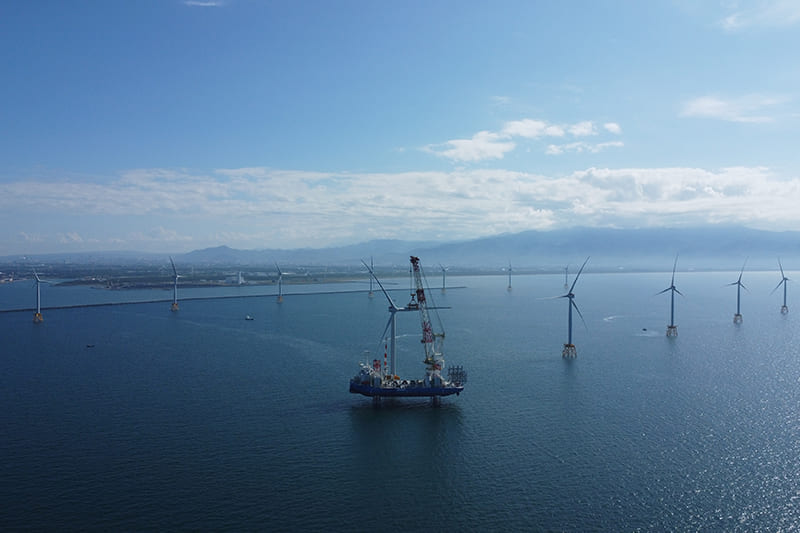
COURTESY OF GREEN POWER INVESTMENT CO. LTD.
Autonomous control AI
In March 2023, Eneos Materials Corp., a subsidiary of the Japanese oil major Eneos Holdings Inc., announced that it had succeeded in achieving the stable operation of a chemical plant using an autonomous control AI and had become the first company anywhere to officially adopt AI for plant control.
For this project, Eneos Materials introduced an autonomous control AI system that incorporates “factorial kernel dynamic policy programming,” an AI algorithm based on reinforcement learning that was jointly developed by Yokogawa Electric and the Nara Institute of Science and Technology. When used at an Eneos Materials plant, the technology reduced both steam consumption and carbon dioxide emissions by about 40% compared to conventional manually controlled systems. This was the first time ever for an autonomous AI to control an actual chemical plant.
Patterned “automatic” control systems are vulnerable to uncertain events, such as sudden changes in weather conditions. At the Eneos Materials plant, for example, skilled human workers were required to intervene in many cases.
Still, the company was able to “prove that AI works,” said Chika Furukawa, Yokogawa Electric’s chief sustainability officer and head of the Sustainability Promotion Department.
“In the first place they had a labor shortage and an issue with their ability to pass on the skills and sensibilities of veteran workers,” she continued. “In the process of automating various controls, there were still areas that could not be solved without veteran workers. So, the fact that AI was able to solve such issues while reducing energy use and CO2 emissions is a major step forward for both Yokogawa Electric and industries using conventional plants.”
Yokogawa Electric’s DCS and CI servers have already been installed in many plants of key heavy and large-scale industries, including oil and steel. Fukuda said the autonomous control AI can be applied to these production sites.
“The autonomous control AI is a technology that can be used for anything that is controlled,” he said. “Decarbonization efforts, such as efforts to increase the use of renewable energy, are important, but … emissions cannot be completely eliminated in production and manufacturing processes that use fossil fuels anytime soon. I think Yokogawa’s control systems, including those that use AI, can contribute more to reducing CO2 emissions in such industries.”
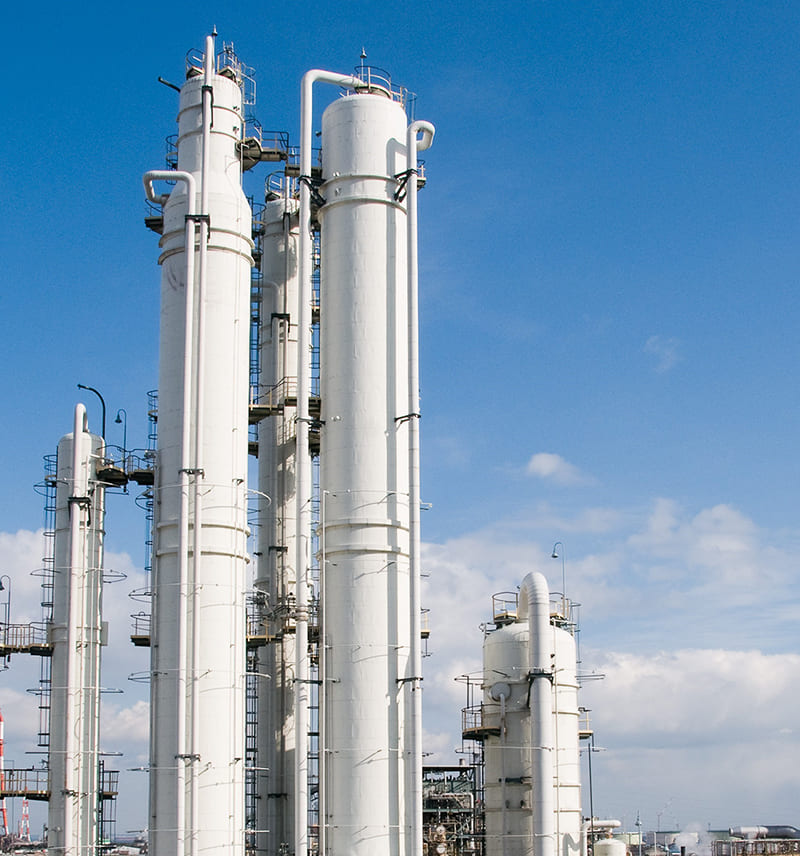
COURTESY OF ENEOS MATERIALS CORP.
An indispensable role
Yokogawa Electric’s control systems, which have evolved with AI, appear set to further accelerate efficiency improvements in conventional industries, including the heavy industries of oil and steel, and contribute to energy conservation and decarbonization. This is symbolized by the target of a billion-ton reduction in greenhouse gas emissions mentioned earlier. It reflects the positive impacts of renewable and green energy projects in which Yokogawa Electric has a role, not just the impacts achieved through using its systems themselves.
How much more carbon would be emitted if Yokogawa Electric’s control systems did not exist? The company is trying to estimate this, but the calculations involved are complicated, making it difficult for the company to release numbers publicly. If all of its positive impacts are included, the amount of its emissions reductions may exceed 1 billion tons.
Furthermore, the billion-ton target was set in 2017, preceding recent leaps in AI technology. Yokogawa Electric’s AI, used in combination with DCS and CI servers, appears set to contribute significantly to reducing the carbon footprint of existing plants and achieving more efficient generation of renewable energy.
Yokogawa Electric is playing a remarkable role in everything from the decarbonization of key industries to managing green energy. The scope of its activities is expanding to include everything from a “confocal scanner” unit that enables the observation of living cell activity, used in drug discovery and medical practice, to the support of the reuse of lithium-ion batteries from electric vehicles.
As these technologies are used in innovative fields, client companies are reluctant to disclose information about their achievements, but there is no doubt that they support leading companies in research and development.
Yokogawa Electric continues to urge many companies in many countries to do important things for humanity and the Earth. As a company indispensable to industrial activities for sustainability, its contributions to society are only increasing.
The Three Goals and corporate culture
Akira Fukuda
Vice president, executive officer and head of the corporate administration headquarters
Looking back on the various sustainability initiatives we have undertaken so far, I feel that the Three Goals we announced in 2017 have been very important in that they made us realize afresh that we are on the side that supports society.
All of the medium-term management plans that we have set from 2017 onward were formulated as a pathway to achieving these goals. We clearly state that our business activities themselves contribute to achieving sustainability. We are not trying to conform to current trends, nor are we just trying to make ourselves look good. We have had that kind of corporate culture from the beginning.
Yokogawa Electric, at its base, has values that make us feel happy to be what you might call unsung heroes, being useful for people behind the scenes while taking pride in supporting the foundations of society.
The reason for this is that our mainstay products, distributed control systems, reflect this culture. They support operations at large power plants and all kinds of factories, and as such play an indispensible role.
DCS enable the efficient use of limited resources and time, ensure security and safety, and enhance reliability. Customers can rely on us to take control of large, complex and critical processes. Through such services, each and every employee becomes involved in building a relationship of trust with customers.
Recent initiatives, such as the Three Goals, are the result of sorting out these values, and sustainability was built into the basis of our business in the first place.
So, if I were to answer the question of why we are serious about sustainability being the foundation of our management, I would have to say that it is because we have been a company like this from the beginning. I feel that this kind of culture has naturally been nurtured through our work, and that the company has attracted employees who naturally value the Three Goals not only in Japan but also internationally.
We are not a company that is doing eye-catching things. We may appear to be a simple company, but as our purpose states, we take pride in the phrase “Utilizing our ability to measure and connect, we fulfill our responsibilities for the future of our planet.” Going forward, my hope for the company is to step out from behind the scenes to fully embody our values and fulfill our responsibilities.
低炭素化・脱炭素に貢献する「制御」。
石油精製・化学、鉄鋼、繊維、医薬、食品、水、発電、ガス……。横河電機は、あらゆる産業の大規模プラントや工場などに向け「制御システム」を導入してきた。
横河電機の制御システムは今、世界中の企業のCO2削減に、あるいは、再生可能エネルギーの効率的な発電に多大なる貢献をしている。その数字は「億トン単位」。同社が排出する温室効果ガス(GHG)とは桁が違う。
2017年、横河電機は2050 年に目指す社会の姿を定めた「Three Goals」を公表。同時に、2030年に向けた中期目標を掲げ、気候変動対応では「2030年までにGHGのScope1と2をゼロに、Scope3を30%削減する」という自社グループ内の目標を掲げた。さらには「お客様事業のCO2排出抑制量」を、2018年度から30年度までの累計で「10億トン」とした。その量は、日本全体が1年間で排出する量に匹敵する。
なぜそんな大それた目標を掲げることができるのか。答えは、横河電機が主力とするプラント・工場向け「統合生産制御システム」関連のソリューションにある。
Return to Sustainable Japan Magazine Vol. 49 article list page


